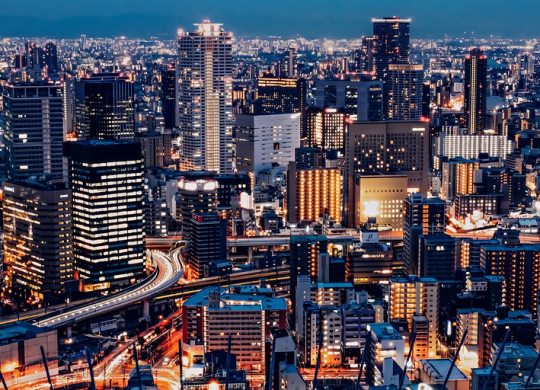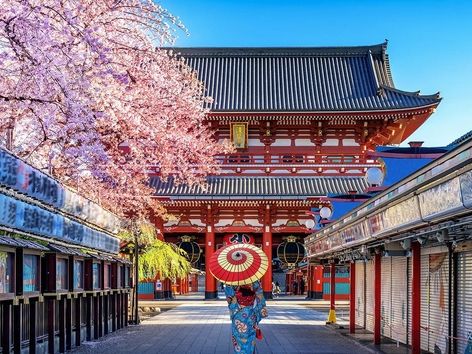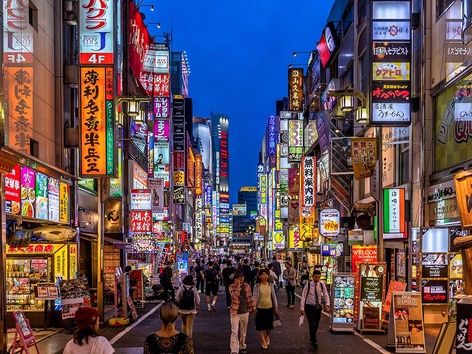Job in Japan for expats in 2024: labor market, work visa and basic requirements
Table of contents
- Advantages and disadvantages of employment in Japan
- Features of the Japanese labor market
- Requirements for foreign workers for employment in Japan
- The level of wages in Japan
- Who needs a work visa to work in Japan?
- List of specialists who have the right to a work visa to Japan
- How to apply for a work visa to Japan?
- A package of documents for obtaining a work visa to Japan
- Duration of Japanese work visa
- Is it easy for a self-employed person to get a job in Japan?

Japan is a promising country for expats to move to, which attracts high quality of life and career prospects. Considering that in recent years the state has increasingly opened its doors to foreigners, local employers are increasingly hiring specialists from abroad. Find out what are the features of the Japanese labor market and how a foreigner can get a work visa in the country
Japan is a unique country that attracts expats from different parts of the world, including citizens of Tunisia, Kenya and Bangladesh, with its special labor market. There is almost no division into classes in the country, everyone in the state lives and works in approximately the same conditions with more or less equal wages. Usually, an office worker with a higher education does not receive much more than a factory or coffee shop worker. Another advantage of moving to Japan is the high quality of life.
More on the specifics of employment in Japan for foreigners in 2024 in this article.
Advantages and disadvantages of employment in Japan
Working in Japan offers many advantages for foreigners:
- High average salary of almost ¥4 million (US$37,800) per year.
- Culture of joint business.
- Life insurance, work and health insurance.
- Mandatory deductions to the pension fund.
- Guaranteed bonuses 2-3 times a year, depending on the company's profit.
- Payment of transport to the workplace and home.
- Usually, the employer also pays for the accommodation of his employees. And he does everything possible to ensure that the company's team is united.
- Foreign workers who do not stay in Japan can receive a one-time social insurance payment upon departure.
- If you have been in Japan for at least 25 years, you can receive this amount as a retirement pension.
Although employment in Japan has significant advantages, you should be aware of equally significant disadvantages:
- The official and actual salary level may differ significantly. After all, income tax is deducted from the official part of the salary (from 10 to 20%), as well as monthly contributions to pension and insurance funds.
- Unpaid overtime work and an intensive schedule are the norm here. The Japanese see no problem with being late for an hour or having only 30 minutes for lunch in a 12-hour workday.
- A small number of weekends and vacations, amounting to up to 14 days per year, most of which fall on public holidays.
Features of the Japanese labor market
In the past, the Japanese job market was not known for being hospitable to foreigners. However, the situation has changed in recent years, as Japan has seen the growth of not only international companies opening up in the country's major cities, but also an influx of expats moving to the small island nation. Because of this, Japan has even simplified obtaining a social security number for expats.
Importantly! An interesting feature of Japan's job market is that expats who want to find work in Japan should look for it in early spring or late summer, as these are the best months for employment in the country.
The Japanese are very work-oriented, the working week here lasts from Monday to Friday, but the working day is very long.
In Japan, the workforce is seen as a big family, so Japanese employers expect employees to devote a lot of time and effort to their careers.
Requirements for foreign workers for employment in Japan
The unemployment rate in Japan is only 3%. That is, there is no shortage of workers in the country. And finding a dream job is quite difficult for foreigners. In general, to get a job in Japan, an employee must:
- Know Japanese and English at a conversational level.
- Have a higher professional education not lower than a bachelor's degree.
- Demonstrate professional work experience.
- Confirm the absence of diseases, disabilities or mental disorders.
- Have a work visa and work permit.
Preference is given to young (under 40) men who have an education in the field of law, medicine or shipbuilding. And also to teachers of humanities (especially English).
The level of wages in Japan
The average salary in Japan is just over 6 million yen ($40,000) per year. The minimum wage is 961 JPY (6.44 USD) per hour.
As one of the most expensive cities in the world, Tokyo has one of the highest average annual salaries in the world: 576,000 JPY per month (US$3,862). Its minimum hourly wage is also the highest in Japan, followed by Osaka and Okinawa.
Since the cost of living is high across the island of Japan, a good salary to live comfortably is an average annual salary of ¥4.5 million ($30,000).
Who needs a work visa to work in Japan?
Every foreign national who intends to move to Japan to live and work for any length of time must have a Japanese work visa.
Only nationals of several countries are exempt from the visa requirement and it only applies to those entering as tourists, short-term visitors, business personnel or for other recreational purposes.
A visa is required for a long-term stay in Japan for any purpose.
The Japanese government has an entry system for highly qualified foreign professionals to attract talent to the country. A Japanese visa for highly qualified specialists is issued according to a point system to foreigners who meet certain criteria. How to issue a visa for highly qualified specialists in Japan and how much it costs, read here.
List of specialists who have the right to a work visa to Japan
Representatives of a certain number of professions have the right to issue a work visa to Japan, including:
- Artists (photographers, composers, songwriters, sculptors, etc.).
- Business leaders – company presidents, directors, etc.
- Engineers or specialists in the field of humanitarian sciences or international services - scientific or IT engineer, translator or copywriter, foreign language teacher, designer, etc.
- Entertainer, actor, musician, singer, dancer, athlete, etc.
- Instructor or teacher of elementary, middle or high school.
- A person who was transferred within the company (to the Japanese branch).
- Journalists, editors, news operators, announcers, etc.
- Employees of the legal sector and accounting (lawyers, court clerks, accountants, tax accountants, etc.).
- Specialists who provide medical services (doctors, dentists, pharmacists, nurses, etc.).
- Professors, in particular a university professor or associate professor.
- Religious activities, such as monks, bishops, missionaries, etc.
- Scientific employees of research institutes.
- Skilled workers such as foreign cooks, animal trainers, pilots, sports trainers or foreigners who have experience and skills in certain industries, etc.
- Technical interns.
Visa Business Manager – work and residence permit in Japan for expats who plan to open a business in the country. Read in this article who has the right to obtain this permit and what package of documents is required for registration.
How to apply for a work visa to Japan?
The procedure for applying for a work visa consists of the following stages:
Stage 1 – Obtaining a certificate of conformity.
Every foreigner moving to Japan for a long period of time must obtain a certificate of compliance from the Japanese Immigration Service. Your sponsor (employer) processes the application on your behalf, for this you must send the appropriate package of documents to the head of the organization.
Importantly! The Certificate of Eligibility for Japan is not a substitute for a work visa, it is only a pre-requisite and you still need to apply for a work visa to Japan from your home country.
The procedure for obtaining a certificate of compliance with the requirements for obtaining a work visa can take up to three months.
Stage 2 – Applying for a work visa to Japan
Once you receive a certificate of compliance, your employer must send it to you so that you can use it to apply for a work visa:
1. Contact the nearest Japanese embassy or consulate in your country of residence.
2. Prepare the necessary package of documents for processing a work visa to Japan (see below).
3. Apply for a Japan work visa either directly at the embassy/consulate or at a travel agency or visa agency.
4. Pick up the visa - the time for issuing a work visa to Japan is 5 to 10 working days.
A package of documents for obtaining a work visa to Japan
To apply for a work visa to Japan, you must have the following package of documents:
- Certificate of conformity.
- Completed and signed application for a work visa to Japan.
- Your valid passport together with its photocopies.
- Passport size photos.
- Documents that indicate your position in the company/organization, the salary you will receive and the duration of work.
- Documents confirming your previous academic and professional work.
- Documents related to the receiving company, such as company registration, profit and loss statement, etc.
- For artists – any documents that confirm your artistic achievements.
- For religious figures – documents indicating the religious organization sending you to Japan and documents confirming your religious status and career.
- For researchers – documents related to the host organization, academic and professional qualifications.
- For instructors or teachers - documents related to the host organization, academic qualification or educational license.
- For persons moving within the company – documents confirming the relationship between two offices/companies.
- Any additional documents required by the Japanese embassy or consulate, depending on your profession.
To move, travel or work safely in a new country, you will need health insurance. You can apply for an extended policy on our website here.
Duration of Japanese work visa
Japan work visas can be issued for the following periods depending on several factors, such as your profession and the length of your employment contract:
- Three months.
- Four months.
- One year.
- Three years.
- Five years.
However, regardless of the length of your visa, if you meet the requirements, you can apply to extend your work visa before it expires.
Is it easy for a self-employed person to get a job in Japan?
It is possible to work as a self-employed person in Japan, but it will be difficult. Because Japanese culture views the workplace as a family, self-employed people are not held in such high esteem. Freelance culture is slowly gaining momentum in this Asian country, but self-employed expats should expect to have to prove that they are serious and dedicated workers.
One of the easiest ways to become self-employed in Japan is to first come to the country and list a part-time employer as your primary employer in order to obtain a work visa. Once you've got that, you can start working on your freelance business until it's secure enough to sponsor yourself.
In Japan, salaries are high, and the level of social security is quite broad. Especially compared to most European countries. Therefore, working in Japan is the dream of many foreigners, even though it is quite difficult for foreigners to get a job in this country.
We will remind you! Japan is a country of unique cultural heritage, modern technologies and ancient traditions. This state attracts tourists and expats from all over the world with its unique atmosphere and opportunities. We have already talked about the rules and conditions of moving to Japan on the PMP in 2024.
Ihor Usyk - head of Visit World's legal department
Products from Visit World for a comfortable trip:
Checklist for obtaining a visa and necessary documents for Japan;
Legal advice on immigration to Japan;
Travel insurance for foreigners in Japan;
Medical insurance all over the world.
Frequantly
asked questions
Can a foreigner get a job in Japan?
What is the most common job for foreigners in Japan?
Can I move to Japan without a job?
Recommended articles
2 min
Work
Expat jobs in Sweden in 2024: labor market, work visa and basic requirements
Sweden is an economically developed EU country, which in recent years has been experiencing a shortage of personnel more and more acutely. That is why local employers actively seek international talent and sponsor work visas. Find out what an expat needs to work in Sweden in 2024 and which industries are experiencing a shortage of workers
25 Oct. 2024
More details2 min
Education
Studying in Japan in 2025: A Detailed Guide for International Students
Studying in Japan is becoming increasingly attractive to international students. The country offers high quality education and is known for its innovation, cultural richness and hospitality. However, moving to another country to study can be a complex process that requires detailed planning and preparation. Find out more about how to study in Japan in 2025
06 Feb. 2025
More details3 min
Travels
Important Things to Know Before Traveling to Japan in 2024
Travelling to Japan is a unique experience. It is a country that impresses with its culture, traditions and modernity. Find out more about the important nuances that will make your trip to Japan enjoyable and unforgettable
11 Mar. 2024
More details1 min
Residence permit
Working in Italy: quotas for 2026–2028, when to apply and main sectors
In Italy, as in most EU countries, the issue of labor shortage is acute. That is why the country is actively working to attract foreign specialists. Find out what quotas for work visas are set for 2025 and how migration legislation will change
07 Nov. 2025
More detailsAll materials and articles are owned by VisitWorld.Today and are protected by international intellectual property regulations. When using materials, approval from VisitWorld.Today is required.
